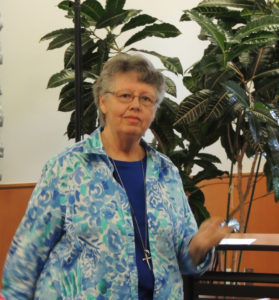
My Parish Pastoral Ministry in Tocopilla, Chile
by Sister Ema Maureira Gonzalez, SP
I live and work in the beautiful far north of my country, Chile, in the city of Tocopilla, which I love for its landscapes of mountains and sea. In this local community, there are two of us, simple, humble and charitable sisters. Every day we place ourselves in the hands of our Provident God and our Mother of Sorrows. We pray for the entire world, especially for vocations and for our approaching General Chapter.
I arrived in this place in February 2013, putting myself at the service of the parish pastoral ministry. Father Ramón Henríquez Ulloa, who comes from Los Angeles in the south, near Temuco, accompanies us in this ministry.
I am currently carrying one of the most appreciated ecclesial tasks of our Church, i.e., family catechesis. I am the catechesis facilitator of the Nuestra Señora del Carmen Parish; I and others work in a team with Father Ramón, who is our guide.
I feel happy to move toward my goal in this ministry. I know I can do it because I’m ready for whatever may happen. I facilitate meetings to prepare baptisms, marriages and confirmations. I do liturgical celebrations, expose the Blessed Sacrament, participate in retreats with adults, youth and children, and give a course on the Bible. I am passionate about all of these tasks, because, in addition to deepening my Biblical knowledge, I can guide others in deepening their knowledge and love of God.
Whenever the parish priests are absent for any reason, Sister Herna Astorga, SP and I are available to respond or for leading the prayers offered at the cemetery. Moreover, every Friday I go to Antofagasta to accompany the community there and to open the church for any eventuality. Thus, Ms. Aurora Suazo and her collaborators can offer their workshops and I can take the opportunity to give them a course about the Bible.
Here, in Tocopilla, I animate up to five Masses on Sundays. I am grateful to my Congregation for the formation I have received and for the courses I followed when I was young; thanks to them, I learned a lot. Now, that I have matured, I am useful to my brothers and sisters in different communities. I am a simple person; simplicity opens doors. If there is something I do not know, I ask; I search and look for the information to give a correct answer.
Now, I am 70, but I feel like 40. Although I sometimes get a bit tired, I recover quickly. With so much wealth of health, time flies; I think it is because the days are busy with so many things that have to be done!
Providence of God, I thank you for all.





 Sister Patricia (Pat) McKittrick is a Sister of Providence from Emilie-Gamelin Province who lives and works in the United States, more precisely, in the state of Vermont. She is very involved in community and parish life in Winooski and here she shares with us about one of the community activities in which she participates.
Sister Patricia (Pat) McKittrick is a Sister of Providence from Emilie-Gamelin Province who lives and works in the United States, more precisely, in the state of Vermont. She is very involved in community and parish life in Winooski and here she shares with us about one of the community activities in which she participates.
